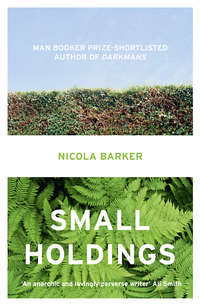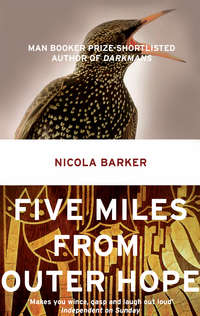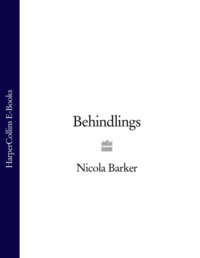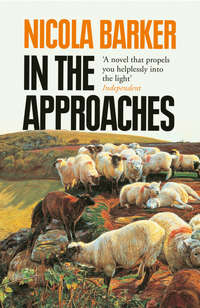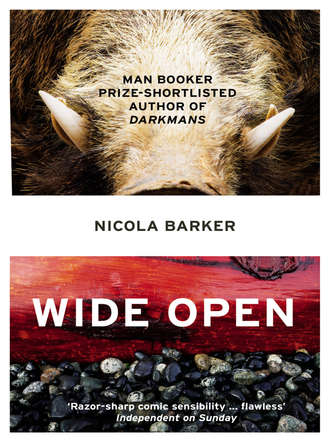
Полная версия
Wide Open
Instead she made an effort to be nice. A huge effort. If she offered to make her workmates tea she’d ask Nathan first whether he fancied a cup. She always wrote his name at the beginning of the postcards she sent to the office from holidays abroad. She always remembered the date of his birthday. 12 November. Scorpio. She always did a collection. She always saved the hazelnut whirl for him when someone brought chocolates to work. That was his favourite chocolate. In fact, she made all the silly, goofy gestures she’d never made before, when she’d really, truly loved him.
And Nathan always took the hazelnut whirl with good grace. It was his least favourite chocolate but Laura seemed to get pleasure from giving it to him. So he took it.
Did he know how she’d loved him? He didn’t think about it. His mind was elsewhere. Sometimes he felt a vague sense of unease when she was near him, when she smiled at him – too brightly – or when she came over especially just to say goodnight.
On these occasions he felt like she was overcompensating – which she was – and although he didn’t know what she was overcompensating for, he imagined that it was for something secret and sad and untoward.
He was right. That’s just how it was. Three years of dreams. Three years of watching and waiting, of apprehending and misapprehending. All that time wasted. All that time.
He was a softie. Sometimes he cried over the forgotten things. The special things that he kept in the special places. The bangles with loving inscriptions, the tufts of hair in golden lockets, the small dinners in plastic bags. Meals for one, and the one had forgotten them.
Sometimes he came into work early to walk around and feel the forgotten things, to try and remember them. At night he listed forgotten things in his dreams. He lovingly dwelt on the eight hundred and forty-seven black umbrellas, the fifteen hundred and sixty-two single gloves, the books, the pairs of glasses, the knick-knacks, the scarves, the hats. Unclaimed. Everything. All forgotten.
Laura caught him once, after hours, in the storeroom, huddled in a corner, poring over something. She drew close and then softly spoke his name.
‘Nathan?’
He sprang up, knocking pictures to the floor, a pile of photographs – polaroids mainly, but some others too, black and white photos. She knelt down to help him retrieve them.
‘Isn’t it funny,’ she asked gently, ‘the things people leave behind?’
And in her hands she saw photographs of a little boy with brown eyes and a mop of hair, naked. And there was something wrong with the photos.
‘It is strange,’ Nathan muttered, his face reddening. ‘It is strange.’
And so it was.
‘Hello?’
Laura looked up, trying to make eye-contact with the next customer in a long line. It was Friday, a busy day, usually. She focused on a tall man with a beard and dark hair. He was holding a large cardboard box and a white form that he’d just filled in.
‘Who’s next?’
She waved at him. The man hesitated and then came over. He put the box down on the floor beside him. ‘The thing is,’ he said, ‘I was hoping to speak to …’
He pointed towards Nathan who was in the furthest cubicle, collecting the fee and giving receipts.
‘You have to see me first.’
Laura put out her hand to take the man’s form. He had terrible writing. She stared at it for a while.
‘You’ve lost a watch?’
He nodded.
‘When did you lose it?’
The man felt his right wrist with his left hand. ‘Uh … very recently.’
‘Okay. Fine. Hold on a second.’
Laura stood up and went over to the computer. She keyed in the relevant details. Nothing.
She returned to the counter. ‘I’m sorry. There’s nothing on file at the moment. But don’t lose heart. It might be a few days before it’s finally handed in. Can you give me any extra details about the watch?’
The man shook his head.
‘Make?’
He shook his head.
‘How old was it?’
‘Old.’
‘Was it valuable?’
‘I don’t think so.’
‘Well perhaps you could draw an illustration of the face so that if it’s handed in we might have some means of recognizing it.’
The man tried to oblige her. With his left hand he drew a traditional clock face with all the numbers. Laura couldn’t stop herself from smiling.
‘You’ve got a lovely smile,’ the man said.
She floundered. He looked straight into her eyes. ‘I like the way that you said don’t lose heart before. I loved that.’
Then he paused. ‘I’m sorry,’ he scratched his cheek, ‘I didn’t mean to embarrass you.’
‘I’m not embarrassed.’
But she was. There was something about his salad-green eyes that disgusted her. Something not right. An emptiness. He was like an old sandwich with curling edges, left on a plate at a pointless leaving party which nobody wished to attend.
She handed him back his form and spoke rather abruptly. ‘It’s a two pound fee. You pay at the counter.’
‘Thank you.’ The man nodded, took the form, bent down to retrieve his box, then staggered over towards Nathan’s cubicle. He had a funny walk, Laura observed. Her next customer arrived and passed over his slip. She took it, but her eyes were focused, with some disquiet, on Nathan and on the man.
Nathan had been thinking about his lunch. His stomach had been growling. He checked his watch. Someone handed him a slip.
‘That’ll be two pounds, please.’
He looked up. His jaw went slack.
‘It’s me,’ the other Ronny said, ‘like a bad coin. Back again.’
Nathan snapped up his jaw and struggled to contain his surprise. ‘You shouldn’t have come back,’ he said quietly, ‘not so soon. Things are too complicated.’
‘Why?’ the other Ronny looked confounded, ‘Why are things complicated?’
Nathan cleared his throat. ‘I’ll have to tell Margery.’
‘Margery who?’
Nathan passed his hand in front of his eyes. ‘Don’t kid around with me, James.’
‘No. Not James. I’m Ronny. Remember? Call me Ronny.’
Nathan shifted on his stool. ‘Don’t be stupid …’ he was virtually whispering now, ‘we’ve already had this conversation.’
The other Ronny smiled. His teeth were immaculate. ‘I’m Ronny,’ he said softly. ‘You gave me his shoes.’
‘What?’ Nathan looked mortified.
‘His shoes. You gave them to me. Three weeks ago.’
Nathan put his hand to his face. His cheeks were hot. He looked around, vaguely panicked. He caught Laura’s eye. His blush went deeper.
‘They weren’t his shoes. You have no reason to think that they were. Anyway, I told you quite clearly last time you came here that if you returned then I would have to call Margery. I made a promise.’
The other Ronny nodded. He obviously remembered. ‘You did tell me that last time, but then you went straight ahead and gave me his shoes. His white shoes.’
There was no hint of malice in the other Ronny’s voice. Nathan made his hands into fists on his lap. He knew that there was never malice. Not ever. He took a deep breath. ‘I covered up for you before. Not again. And they weren’t his shoes. They’re your shoes.’
‘He told me they were his shoes. He said he wore them for work. He’s shorter than me but his feet are larger than mine. I have very small feet.’
Nathan inspected the other Ronny’s form.
‘You want a watch?’
‘Yes. I believe I lost one.’
‘Here …’
Nathan began to unfasten the strap to his own watch. The other Ronny stared, unblinking. ‘He said he hadn’t seen you in over ten years. He’s got alopecia.’
Nathan unfastened the watch and held it out in the palm of his hand. It was a gold watch, an old watch.
‘He was driving a green Volvo.’
‘Take the watch.’
Nathan proffered the watch. The other Ronny took it.
‘It’s gold.’
‘Yes.’
‘It must be worth a lot.’
‘It’s mine. I want you to have it.’
Nathan glanced up and over towards Laura. She was momentarily occupied.
‘You’d better go.’
‘You don’t believe me, do you?’ The other Ronny was frowning. ‘You don’t believe I actually met him.’
Nathan shook his head. ‘No.’
‘Maybe I dreamed it.’
Nathan shrugged. ‘Maybe.’
‘Thanks for the watch.’
The other Ronny smiled again. He took a step backwards. He’d deposited his cardboard box on Nathan’s counter. Nathan scrutinized the box.
‘What is this?’
‘Nothing. Look after it for me. Try not to open it.’
Nathan stood up and touched the box. ‘What’s inside?’
‘Everything.’
Nathan scowled. ‘Don’t be stupid.’
The other Ronny turned to leave. Nathan couldn’t stop himself.
‘Where will you go?’ he asked.
The other Ronny scratched his nose. ‘Manchester.’
‘Why Manchester?’
He just shrugged.
Nathan took a deep breath, then expelled it nervously. He wished he hadn’t asked. Now he’d be obliged to tell Margery where the other Ronny was, if he was going to be honest. And he wanted to be.
‘Thanks.’
The other Ronny limped out. Nathan snatched up his form, screwed it into a ball and pushed it into his jacket pocket. Then he picked up the box – it was heavy – deserted his post, walked into the men’s toilets, dumped it down next to the latrines, walked a few steps, rested both his palms on the sink, stared at himself in the mirror and retched. He retched again but nothing came out. Just air. Just gas.
A retch, he thought, is like a dry fuck.
Oh Christ. Oh Christ. Where did that come from?
3
‘The water’s flat and brown. The sand’s made of shells. It’s been raped by those whelk farmers. The sea, I mean. Raped by those fucking seafood fishermen.’
Lily pointed towards the sea. The man she spoke to was fat and smelled of fish, but he had a good tan and a big prick. He was on his way to the beach.
Lily sat astride her mountain bike. She was seventeen. She was conducting her own little war, but she didn’t know what she was fighting about, not yet, at least. She had widely spaced eyes. At school they’d called her Miss Piggy, because of her strange eyes and because her parents ran a farm. They kept wild boar. Although, as Lily often observed, wild boar actually had eyes that were quite extraordinarily close together.
Lily had wide eyes and a flat nose and a gap between her front teeth. It was as though her face had hardly bothered fitting together. But the skin had been persistent. It had stretched and stretched until it finally joined up, until it met in the middle. It had touched bases. It was one of those faces.
Lily pointed. ‘That’s the Swale. It’s a nature reserve.’
‘I know.’
The man looked uncomfortable. He made as if to surreptitiously cover over his genitals with his hands. Lily noticed. ‘You’ve nothing there that I haven’t seen countless times before.’
He grimaced.
She rubbed her arms. ‘Fuck, it’s cold. You must be freezing.’
‘I’m just going in for a quick dip.’
‘Like I was saying,’ Lily continued, ignoring his response, ‘that’s the Swale, and that there’s the Blockhouse. Right over there, beyond where you can see is the Ferry Inn and the church. Harty church.’
‘I know.’
Lily scowled. ‘Would you stop saying “I know” all the time?’
‘But I do know. I’m renting one of the prefabs. I’m living in Sheppey now.’
‘Yeah, well, what you don’t know, apparently,’ Lily said, smiling, ‘is that I can report you to the police for walking down this road naked.’
The man, under considerable duress, tried his best to hold his own. ‘That’s my prefab,’ he said bullishly, ‘I mean I’m renting it. So this here is the front of my house. And that …’ he pointed, ‘is the nudist beach.’
‘But this,’ Lily indicated with a flourish, ‘this is the sign that says you must put on clothes to go beyond that point. See?’
‘But there’s no one about.’
‘I’m about. And someone else lives in that prefab. Your neighbour. He’s short and bald and he’s always well covered. He would probably also be disgusted if he saw you this way.’
‘I’m not disgusting, I’m just naked. And this is a nudist beach.’
‘That is a nudist beach. This is the public highway.’
The man said nothing. Lily appraised him, coolly. ‘I’ve lived around here a long while. See those over there?’
She pointed at a cluster of houses; small, purpose-built chalets. He nodded. ‘That’s where you people go.’
‘Pardon?’
‘The Hamlet. It’s fenced off, see? That’s where all the temporary people go. Nobody permanent has anything to do with them. We think they’re weird.’
He glanced over at the chalets as though he hadn’t truly noticed them before. ‘Perhaps they think you’re weird.’
‘What?’
Lily crossed her arms.
‘I’m going to the beach now. It’s too cold to stand around talking.’
‘Fine.’
The man – he was called Luke Hamsun, he was forty-seven and a professional photographer – walked past Lily and on to the beach. Lily turned and watched his retreating torso, then she threw down her bike and went to peer inside his prefab.
Luke had found the idea of a shell beach appealing, initially. It brought to mind the image of Venus rising from her oyster. This whole place is practically deserted, he thought bitterly, and yet fate brings me bang into contact with Prissy Miss Moon Features.
He wondered what Lily’s name was. He wondered whether she’d prove photogenic.
No people. He recited this like a mantra. No people. That’s why I’m here. No drink. No fags. No people. No sex. No stress. No people. Just emptiness. That’s all.
The sea was brown. It wasn’t even the sea, really. It was the channel. This place is truly the back of beyond, Luke thought smugly. It was grey and bleak and very flat. It was like the moon, in fact. But did they have seas on the moon? He remembered hearing something similar in a way-distant geography lesson but he couldn’t decide if the seas in question were wet seas or dry seas.
How could you have a dry sea? And if the sea on the moon was wet, wouldn’t the water float off because there was no gravity on the moon to hold things down?
He walked along the beach. The shells were actually quite hard on his feet. His feet were tender, underneath, and so was he. He held in his paunch. Nothing moved. He supposed that the muscles on his gut had stopped working. He breathed out. No, they had been working after all. He coughed. His belly hurt.
The brown water lapped at his feet. It was icy.
Oooohhhhh! Much colder than he’d imagined. He was naïve like that. This instance was entirely typical. He moved back a step. The sky was massive. Flat land, flat sea, and a great big, dirty, mud-puddle of a sky.
It looked like it was going to rain. He shivered. He peered over his shoulder to see if the girl had gone. It seemed like she had.
As Luke strolled back to his prefab he confidently sidelined any thoughts of his own physical timidity (shouldn’t the sea feel warmer in cold weather? He’d certainly always thought so. He’d been misled, clearly) and instead he bolstered himself by imagining the cosmos; black, enormous, dotted intermittently with diamond-chip stars, and then a sea, floating. A giant sea with waves and foam and everything. Just, kind of, floating.
He imagined himself, Luke Hamsun, on the moon, moon-walking. He’d been sent to the moon to recapture the sea, to tighten it up, to winch it down.
Over his shoulder Luke pictured heavy ropes which were weightless because nothing weighed on the moon, and in his hands a dozen giant tent pegs. He was supernaturally powerful. He was Flash Gordon. He had no back problem. No gut-ache. His sciatica was a phantasm. He would never keel over and die. He was no longer forty-seven.
And in some respects this was actually true. At least it could have been true in a different world. It just so happened that Luke Hamsun was an earthling, and as such, he was obliged to endure the drag of gravity. He was grounded.
But he endured phlegmatically, cheerfully almost. He didn’t complain. He saved his breath. In fact he hoarded it. He held it.
Lily, meanwhile, had made herself comfortable on Luke’s sofa and was inspecting one of his portfolios.
‘Oh good,’ she said calmly, when he strolled back inside, turning a photo around so that he could see it properly, ‘now you’ve returned you can set me straight on this. Is that a pickaxe up her arse or …’
‘How did you get in here?’
Lily lifted the photo and reappraised it. ‘If you’ve got no trousers then you’ve got no pockets. If you’ve got no pockets then you’ve got no keys.’
Luke felt enraged, violated, defiled, but when he finally spoke it was with great softness. ‘Put those down and get out of here.’
Lily, rather surprisingly, responded to the softness. She closed the portfolio.
‘You’re a bit of a pervert then, on the quiet?’
‘You’re a silly little sneak.’
‘A what?’
Lily stood up, smirking. Luke felt embarrassed by his nakedness and picked up a coat from a chair by the door. He put it on. He looked ridiculous now, naked, wearing only a coat. The coat was incriminating.
‘So that’s why you’ve come here,’ she said, pouting deliciously, ‘to take some more of these dirty pictures?’
‘They aren’t dirty pictures.’
She’d struck a nerve. She knew it. She always knew. She laughed. ‘So what’s that then?’
Against the wall, yet to be hung, stood a picture of a naked female cupping her breasts like they were two neat apples, but the breasts had been yanked up high as though she planned to pillow her chin on them. It looked uncomfortable.
‘It’s a nude.’
‘A nude. Oh. I get it.’
Lily continued to eye the picture.
‘Ouch!’ she said.
‘Get out.’
‘Certainly.’
She sauntered towards the door.
‘If you break into my house again I’ll call the police.’
Lily just giggled. ‘I didn’t break into anything. It was wide open.’
‘Get out.’
‘I’m getting out.’
The sea lapped coldly outside the prefab’s door. Three giant steps and she was in it. Fully dressed. Feet, knees, hips, breasts. She waved her arms at him.
‘I’m freeeee!’ she screamed.
He hated her then. She was free.
In fact she had screamed I’m freezing! but a small wave had hit her.
She had no grand scheme. Not yet. Nothing like that.
4
No one else would do these jobs. It was like being a spaceman, but with all of the discomfort and none of the glory. In the trade they called them skins. There was a theatrical side. Ronny did that sometimes but he hated being around children.
Then there was the industrial side. Councils hired him to spray weedkiller, to clean stuff up, to juggle with noxious chemicals. Someone had to do it. So Ronny obliged. He was that someone. A consummate professional.
Others found the precautionary clothing bothersome and claustrophobic. Several people had sued after contracting breathing difficulties and skin infections from handling dangerous substances. Ronny knew that this was because they took off their helmets when it got too hot. They didn’t take precautions. He always took them. That was his trademark, his hallmark. That was his stamp of quality.
Anyway, it was part of the kick. No air. To be enclosed. The chafing, the sweating. The chronic discomfort. That was all part of it.
He wore white shoes. Special shoes. In fact the entire get-up was white, even the helmet. Ronny peered down at his shoes. He thought about the man on the bridge, wide open, and in the same instant he thought of Monica.
Monica.
She had been his confidante. His correspondent. His best friend. His only friend. He’d liked it that way.
Monica had an opinion on everything. She had an interest in biology. Physical things. She was an adventuress. She hated to be enclosed, which was why, finally, she ended up in Sumatra, in the rain forests. She was working out there with a journalist. They were interested in DNA; all that complex genetic stuff which, quite honestly, meant precious little to Ronny.
Monica could never simplify the nature of her work in conversation without becoming impish and flirtatious. If Ronny couldn’t understand what it was that she was doing she’d crystallize it by saying, ‘I’m interested in what it is that makes a man a man, Ronny. I’m interested in apes.’
So they were searching for a missing ape in the forests of Sumatra. A missing link. A great ape. A fantastic ape. A pale giant. He walked on his hind legs and to all intents and purposes he resembled a man but his feet turned inwards. And unlike his human relations he had no big toes.
Monica had never seen him. She’d seen Ronny though, but only fleetingly, a long time ago. He’d made a great impression. He’d become indelible. He’d left his footprint in the mud of Monica’s brain. She couldn’t shake him.
Oran-pendic. That was the ape’s name. Mr Unpronounceable. In his dictionary Ronny saw that orang – or something quite like it – was Malay for man. Like in orang-utan which roughly speaking translated as ‘man of the forest’.
Oranpendic was not in his dictionary. He didn’t exist. Not yet, anyway. When Monica found him he would exist but not before. When Monica found him Ronny too would see him, not physically – nothing nearly so dramatic – but slotted in among all his other words and definitions. On paper. In print. In bold.
But for now the oranpendic was their own special creature. Not a fact or a definition. Nothing absolute. Merely a fragment.
Ronny looked up pendic for the exercise but could find only pend which meant to hang (as in ‘pendant’). He guessed the word had something to do with per-pend-icular. Upright. Vertical. But frankly he found both this description and the original name unsatisfactory.
Oranpendic.
Monica didn’t give a shit. It didn’t matter. She was more interested in the hunt. She’d been called a hoaxer. Well, not Monica so much as the journalist, Louis, who was the truly infamous half of the duo.
She’d heard him on the radio and then she’d saved up all her money working as a lab assistant at a school in Swindon to fly out and join him. She was impulsive like that. Some called it gullible. Either way, she was never afraid. Nothing daunted her.
Initially the journalist had been discomfited by Monica’s presence. He’d felt invaded. Monica could have that effect sometimes. But then he grew accustomed to her and they began the hunt proper.
Ronny had seen several articles about the hoax. Naturally people doubted the existence of the oranpendic. But the journalist claimed to have seen him, briefly, and his account of this fantastical discovery was fairly convincing.
Monica had a theory about faces. She said honesty was something you could see in a person’s face. Someone’s sincerity, their integrity, was as apparent to Monica on the first meeting as their hair colour or the shape of their nose. This was her preoccupation. Her instinct.
In fact she had two main instincts. The first was for honesty, and the second told her that the oranpendic was alive but that he was afraid. The threat of discovery terrified him. So he kept hidden.
She wrote to Ronny.
He’s afraid, Ronny. I know that much. He lives and walks in fear. Some days, if I wake early, I go out alone just after dawn. Everything is glazed. The air is full of moisture. It’s as thick, as dense as a woollen scarf pressing down on to my lips and up into my nostrils.
At these times I dream I’ll see him. But he’s pale like the mist and he’s so afraid that it’s as if he’s only a ghost. I always have the camera – not Louis’s big professional thing, I have my own, a cheap one that I’ve never yet used, just in case – but I sometimes imagine that if I tried to photograph him, the fear, the focus, the technology, would obliterate him. And all that would remain – in the camera, in the world – would be vapour. A mist and a smell.



